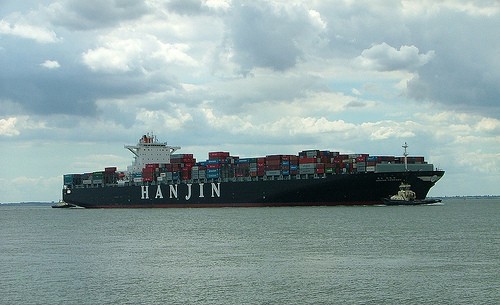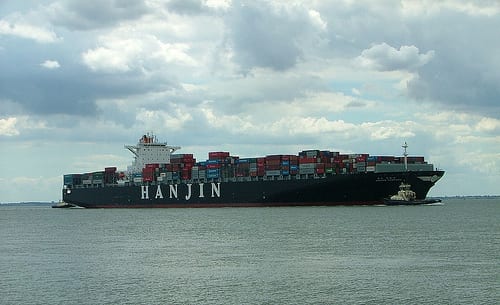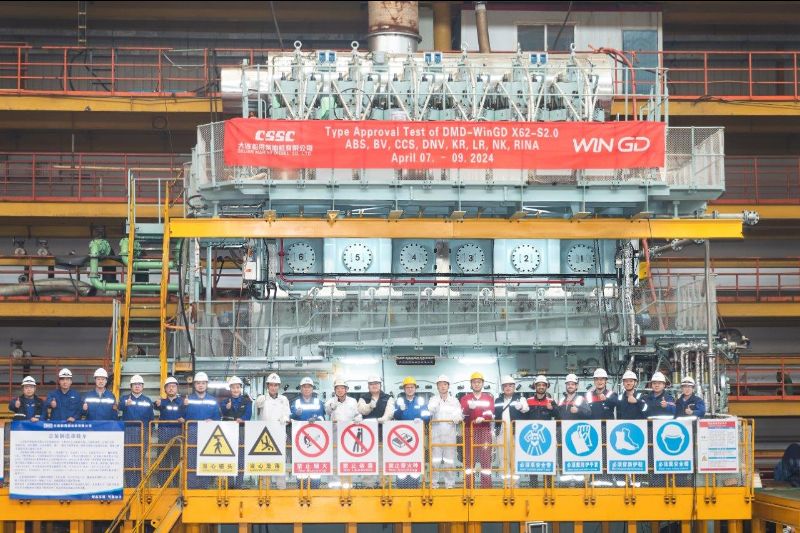
Shipping magnate John Coustas: Getting Rich in Greece

HANJIN GERMANY, owned by Danaos Corporation and chartered to Hanjin Shipping. Photo courtesy Yorkshire’s Finest via Flickr
Shipping magnate John Coustas shows what entrepreneurs can do when Athens gets out of the way
By Anne Jolis, The Wall Street Journal
ATHENS (Dow Jones)–If you’ve ever wondered why so many Greeks succeed in shipping, John Coustas has a plausible theory: “Greek shipping has nothing to do with the Greek state.”
His firm, Danaos Corporation (DAC), is a case in point. Mr. Coustas took over the container-ship owner from his father in 1987 and has since transformed it from a three-vessel outfit into the third-largest company of its kind in the world, with a fleet of 55 ships and a market capitalization of $564.8 million. Danaos is incorporated in the Marshall Islands, a popular and stable jurisdiction for the globalized industry, and handles many of its operations through its German, Ukrainian, Russian and Tanzanian offices.
The fact that Mr. Coustas’s fortune doesn’t depend on the fate of his small Mediterranean country doesn’t make him any less concerned about what is happening to it. The government is on the brink of default after passing its latest round of spending cuts and tax hikes. EU leaders are debating just how punitive to make the terms of its second emergency loan in as many years. And while Athens resembles a First World capital when framed in the picture windows of Mr. Coustas’s sixth-floor office, at eye-level it is littered with garbage and low-quality graffiti, its infrastructure crumbling from neglect and more than a year of semi-regular rioting. Three bankers were killed in a firebomb attack last year, and politicians of the left and the right alike fear to walk the streets.
The biggest risk to Greece is brain drain, that “all the good people, who really have something to offer, are either leaving or seriously considering it,” says the father of four. “What we want is to be able to continue to live in this country.” Right now that outcome is not assured.
The accepted wisdom is that Greece’s tragedy opened when it joined the euro zone in 2001. The rich-country currency club allowed Athens to borrow at interest rates tailored to Berlin and amass debts totaling 155% of GDP today. But Mr. Coustas sees the rot going back much further, to 1974, when politicians in newly re-democratized Greece began expanding the state to “enlarge their influence.” That process accelerated after 1981, when Greeks “got our first Socialist government. In Greece we had socialism through borrowing, and actually politicians were never honest about what the true situation was. That holds across the political spectrum.”
The expansion of the state brought with it “a whole system here in Greece of state subsidies–and here I’m including EU subsidies to Greece–which create more bad than good.” In 2009, one-third of research and development spending in the EU was publicly funded, and in Greece that ratio approaches 50%. When you create “something that has zero kind of entrepreneurial risk…you do it in order to exploit these funds, not to create something productive.”
On top of misguided government spending, “we spent a very long period during which entrepreneurial activity was victimized, during which profit was seen as wrong. It’s a very populist approach, to go and tell the people that the rich will pay.”
Here, Mr. Coustas is not referring primarily to his rarefied breed, but to the roughly 30% of Greeks who are self-employed–the largest percentage in the OECD. “So the ‘rich’ is a much more general kind of thing. Anyone who wanted to make an investment here was considered a kind of bloodsucker.”
Mr. Coustas recalls the early 1980s, when he was in Japan to sign a new shipbuilding contract for Danaos. He was approached by a Japanese workers’ representative who “wanted to thank us for giving them work.” The worker told him, “‘We will do everything possible to build a good ship for you.’ Can you imagine that happening here? Here, if you tried to do the same thing and place an order in the Greek shipyards, you would get protests that either you paid too little, or are trying to pressure the workers, or whatever.”
Little wonder, he observes, that Greece’s Skaramanga and Elifsis shipyards went bankrupt. Danaos’s recent new-build program was worth some $3.5 billion, and Mr. Coustas estimates that the entire Greek maritime sector’s new-build projects were worth close to $100 billion in the last decade: “Imagine if a small fraction of that had been ordered in Greek shipyards.”
He says “everyone agrees that Greece needs private-sector growth,” but “nobody really asks the private sector what is required in order to invest. Nobody listens.”
If they ever do, Mr. Coustas would recommend nothing less than a constitutional overhaul. “I’m really surprised that people still talk about privatization, about investments in Greece, when everybody knows that with the existing constitution, that is largely impossible.” He would start by “removing the Supreme Court’s environmental involvement, through which it can practically annul anything, even if it’s been legislated by the Greek parliament.” He cites this judicial climate as a key reason for why Qatar has yet to proceed with its planned $5 billion investment in the Greek economy.
Equally unhelpful is Greece’s tax code, which Mr. Coustas says “is designed so that the taxman can benefit from the lack of transparency…. He gets bribed in order to accept your illegitimacy.” With businesses’ total levies coming in at 47% of profits, according to the World Bank, supply-siders can make a strong case that Athens is taxing itself out of revenue. But “irrespective of how much it is–of course a lower tax rate helps–what is much more important is the stability and the transparency of the system.” The same goes for Greece’s building-permit regime, which he laments is similarly complex and opaque.
“That’s how you really generate corruption, when things are grey,” he tells me. “When things are black or white, interpretation is very easy; that is why we need a complete rewrite of Greek laws.”
Eliminating this notorious corruption would also require “a true separation of powers…you have to ban members of parliament from becoming ministers.” Mr. Coustas doesn’t expect ministers to be “saints, but at least they should not have any kind of motive to do things purely to get re-elected.”
All this speaks to Greece’s second-most-famous problem, that of its state workers who, by conservative estimates, comprise 15.5% of the total labor force. Politicians of all stripes, Mr. Coustas says, have given lifetime sinecures to this “totally unproductive” army of bureaucrats and now see them as a “sacrosanct” constituency “hiding behind the constitution.”
This state of affairs has led to “two classes of citizens; we have the state employees that nobody can touch, and we have the private-sector employees that you can just leave totally at the mercy of the situation.”
Whether EU-IMF bailouts and chiding can save Greece is beside the point. “These questions are conditional on what Greece is really prepared to do,” and here Mr. Coustas sees “deadlock.” Is he optimistic about the possibility of new elections this fall and the resurgent popularity of Antonis Samaras’s center-right New Democracy party?
“I don’t think really there is much difference. His [Samaras’s] party has also hired a significant number of state employees, he has exactly the same kind of limitations” as Socialist Prime Minister George Papandreou.
Mr. Coustas still has hope for his country, which “has a lot of advantages in terms of climate, agriculture, energy, tourism.” He even sees the potential for Greece to become a premiere destination for retirees–a European Florida. But “in order to do that you need a very efficient health system, definitely more privatization…. The amount of mismanagement in the [Greek] health sector is unbelievable. Can you imagine that today state hospitals do not even keep balance sheets?” Sadly, that is all too easy to imagine.
His own storied industry is “the example of what Greek entrepreneurs can do when the state isn’t nailing us down. If that kind of philosophy extended to the other sectors of the economy, then we would definitely see Greece prosper and thrive.”
(c) 2011 Dow Jones & Company, Inc.

Subscribe for Daily Maritime Insights
Sign up for gCaptain’s newsletter and never miss an update
— trusted by our 109,094 members

Get The Industry’s Go-To News
Subscribe to gCaptain Daily and stay informed with the latest global maritime and offshore news

 Join The Club
Join The Club








